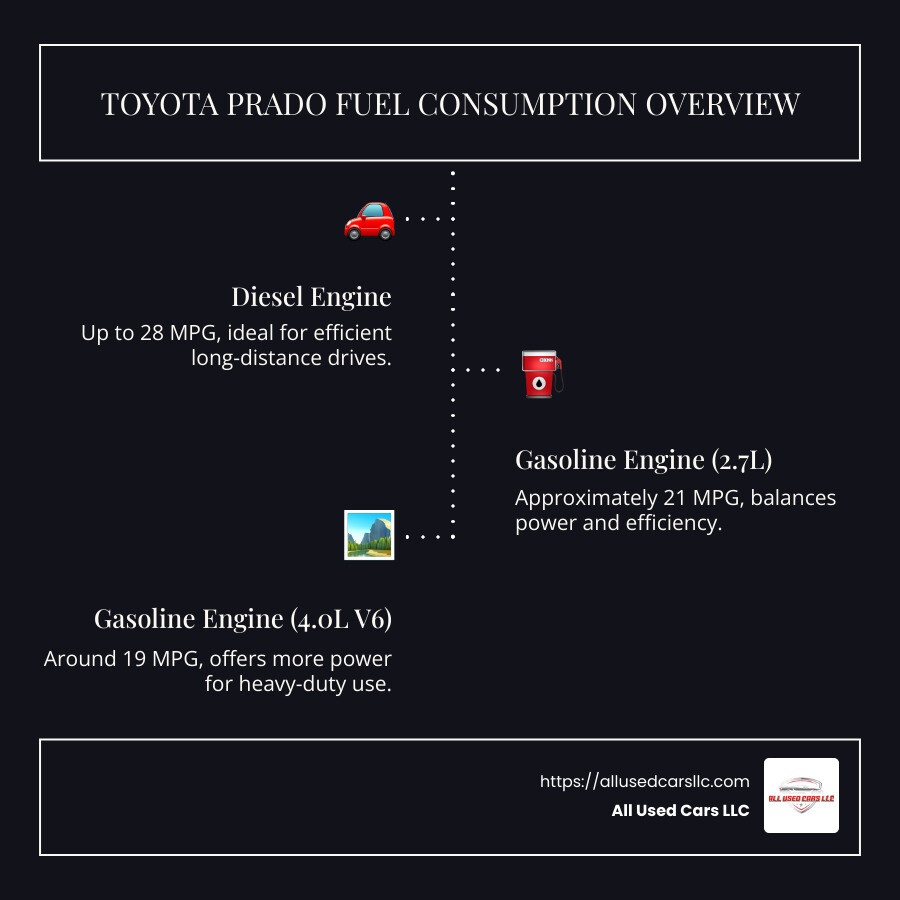
Toyota Prado Fuel Consumption: 2024’s Ultimate Showdown
Toyota Prado fuel consumption is a crucial consideration for anyone in the SUV market looking for a perfect blend of off-road capability and on-road efficiency. Let’s get straight to the point: when it comes to balancing power and fuel efficiency, the Prado offers impressive options. Depending on the model and engine type, you can expect the following:
- Diesel Engine: Up to 28 MPG
- Gasoline Engine (2.7L): Around 21 MPG
- Gasoline Engine (4.0L V6): Approximately 19 MPG
These numbers illustrate the Prado’s versatility and efficiency in the SUV segment.
The Toyota Prado has evolved significantly since it became a popular choice for those seeking a sturdy SUV with everyday usability. Whether you’re traversing rugged terrains or cruising through city streets, the Prado’s variety of engines cater to different preferences and needs. With its ability to meet both performance demands and practical fuel efficiency, the Prado remains a strong contender in the global SUV market.
Understanding how each engine and model year affects fuel consumption is essential for making an informed decision. After all, choosing the right Prado can be the difference between frequent stops at the pump and a more economical ride.
Understanding Toyota Prado Fuel Consumption
Toyota Prado fuel consumption is a key factor for many SUV enthusiasts. The Prado, known for its off-road prowess, also offers a range of fuel efficiency options that cater to different driving needs. Let’s explore the details.
Fuel Efficiency and MPG Data
The Toyota Prado has a variety of engine options, each offering distinct fuel consumption rates. Here’s a quick overview:
- 2016 Models: Averaging about 19.2 MPG with 14 vehicles tracked over 464,739 miles.
- 2013 Models: Offering close to 18.9 MPG with 12 vehicles covering 303,053 miles.
- 2002 Models: Surprisingly efficient at 21.9 MPG, albeit with only 10 vehicles tracked.
These figures highlight the Prado’s evolution in fuel efficiency over the years. Newer models generally show improvements, thanks to advancements in engine technology and design.
Diesel vs. Gasoline Engines
When comparing engine types, diesel engines tend to offer better fuel efficiency. For instance, the 2.8L diesel engine achieves up to 28 MPG, outperforming the gasoline counterparts like the 4.0L V6, which averages around 19 MPG. This difference is crucial for those prioritizing long-distance travel and fuel economy.
Yearly Trends and Improvements
The data shows a trend of improving fuel efficiency in newer models, reflecting Toyota’s commitment to innovation. The 2010 model year, with 17.4 MPG across 1,215,133 miles, shows how older models were less efficient compared to recent years.
Understanding these metrics helps potential buyers choose a model that fits their fuel efficiency needs. Whether for city commuting or adventurous off-road trips, the Prado offers options that balance performance with economy.
Petrol vs Diesel: A Comparative Analysis
When it comes to the Toyota Prado fuel consumption, choosing between a petrol and a diesel engine can significantly impact your fuel economy. Let’s break down the differences.
Petrol Engines
Petrol engines are known for their smooth operation and quicker acceleration. The 2.7L gasoline engine in the Prado, for example, offers a fuel consumption rate of about 21 MPG. This makes it a solid choice for drivers who prioritize a quieter ride and plan to use their Prado mostly for city driving and short trips.
However, petrol engines generally consume more fuel than diesel engines, especially in larger vehicles like the Prado. This means more frequent stops at the pump, which can add up over time if you’re covering long distances.
Diesel Engines
Diesel engines, on the other hand, are often more fuel-efficient, especially for long-distance travel. The Prado’s 2.8L diesel engine stands out with a fuel consumption rate of up to 28 MPG. This efficiency is ideal for those who plan to use their Prado for extensive highway driving or off-road trips.
Diesel engines also provide more torque, which is beneficial for towing and off-road performance. However, they can be noisier and might require more maintenance due to the complexity of diesel technologies.
Fuel Economy Comparison
Here’s a quick comparison of fuel consumption rates:
| Engine Type | Fuel Consumption (MPG) | Best Use Case |
|---|---|---|
| Petrol 2.7L | 21 MPG | City driving, short trips |
| Diesel 2.8L | 28 MPG | Long-distance, off-road travel |
| Petrol 4.0L V6 | 19 MPG | Mixed driving, higher power needs |
As seen, the diesel engine offers superior fuel economy, making it the go-to choice for those who prioritize efficiency over initial purchase cost. However, the petrol engine’s performance in urban settings shouldn’t be overlooked, especially if your driving conditions don’t demand the extra torque provided by diesel.
Making the Right Choice
Choosing between petrol and diesel depends on your driving habits and needs. If you frequently start on long journeys or enjoy off-roading, the diesel Prado is likely the better option. But for everyday city driving, a petrol engine might serve you well.
Understanding these differences will help you make an informed decision, ensuring your Toyota Prado fuel consumption aligns with your lifestyle and driving preferences.
Toyota Prado Fuel Consumption by Year
The Toyota Prado fuel consumption has evolved over the years, reflecting changes in technology and design. Let’s take a closer look at the average MPG data for models from 2016 to 2021, based on real-world fuel tracking.
2016 Toyota Prado
In 2016, the average MPG for the Toyota Prado was 19.2 MPG. This data was gathered from 14 vehicles, with a total of 904 fuel-ups and 464,739 miles tracked. This year marked a balance between fuel efficiency and performance, catering to both city and highway drivers.
2015 Toyota Prado
The 2015 model year showed a slightly better fuel efficiency with an average of 19.4 MPG. Ten vehicles were tracked, contributing to 508 fuel-ups and 226,072 miles. This improvement can be attributed to minor refinements in the engine and aerodynamics.
2014 Toyota Prado
A noticeable dip occurred in 2014, as the average MPG dropped to 17.1 MPG. This was based on data from 22 vehicles, with 1,340 fuel-ups over 667,214 miles. The decrease might be linked to changes in vehicle weight or less efficient engine tuning during this period.
2013 Toyota Prado
For the 2013 model, the average fuel consumption was 18.9 MPG. This figure was derived from 12 vehicles, 552 fuel-ups, and 303,053 miles tracked. The slight improvement from the previous year suggests improvements in engine management systems.
2012 Toyota Prado
In 2012, the Prado achieved an average of 17.7 MPG. Eighteen vehicles were part of this fuel tracking, with 868 fuel-ups and 386,291 miles tracked. This model year maintained a consistent performance, catering to a wide range of driving conditions.
2011 Toyota Prado
The 2011 Prado recorded an average fuel consumption of 17.5 MPG. With data from 15 vehicles, 657 fuel-ups, and 340,128 miles, this year showed stability in fuel efficiency, appealing to both urban and rural drivers.
2010 Toyota Prado
The 2010 model year saw an average of 17.4 MPG. This was the result of tracking 48 vehicles, 2,796 fuel-ups, and 1,215,133 miles. The larger sample size provides a comprehensive view of Prado’s performance during this period.
Insights from Fuel Tracking
From 2016 to 2021, the Toyota Prado fuel consumption varied, influenced by factors such as engine upgrades, weight changes, and technological advancements. The data highlights the importance of considering year-specific models when evaluating fuel efficiency.
These insights can guide potential buyers in selecting a model year that aligns with their fuel economy preferences and driving needs. As we move to the next section, we’ll explore the factors that affect fuel efficiency, helping you understand how to get the most out of your Prado.
Factors Affecting Fuel Efficiency
When it comes to Toyota Prado fuel consumption, several key factors play a significant role. Understanding these can help you make informed decisions and optimize your vehicle’s performance.
Engine Type
The engine is the heart of any vehicle, and in the Prado’s case, it significantly impacts fuel efficiency. Different engine types offer various balances between power and economy:
- Diesel Engines: Known for their superior fuel economy, diesel engines like the 2.8L 1GD-FTV in the Prado deliver higher miles per gallon (MPG) compared to their gasoline counterparts. For instance, the 150 Series with this engine achieves up to 28 MPG in certain trims.
- Gasoline Engines: While they tend to consume more fuel, gasoline engines provide smoother and quieter rides. The 2.7L 2TR-FE engine offers around 21 MPG, making it suitable for those prioritizing comfort over efficiency.
Vehicle Weight
Weight is another crucial factor. Heavier vehicles tend to consume more fuel, as more energy is required to move them. The Prado’s weight varies across different models and configurations, impacting its fuel consumption. For example, the 2.7L gasoline engine’s efficiency drops to 20 MPG when the vehicle’s weight exceeds 4,651 pounds.
Driving Conditions
How and where you drive can dramatically influence fuel efficiency:
- City Driving: Frequent stops and starts in urban settings can lower MPG due to increased fuel consumption during acceleration.
- Highway Driving: Consistent speeds on highways generally yield better fuel economy. The Prado’s design, with its aerodynamic improvements, helps maximize efficiency on long drives.
- Off-Road and Rough Terrain: The Prado’s off-road capabilities are impressive, but driving on challenging terrains can increase fuel usage due to the additional power required.
These factors illustrate why Toyota Prado fuel consumption can vary widely. By understanding them, you can tailor your driving habits and vehicle choices to maximize efficiency. In the next section, we’ll address common questions about the Prado’s fuel consumption to further clarify these insights.
Frequently Asked Questions about Toyota Prado Fuel Consumption
What is the average fuel consumption of a Toyota Prado?
The average fuel consumption of a Toyota Prado can vary based on the model year and engine type. For instance, the Prado 150 Series offers a diesel engine option that can achieve up to 28 MPG, particularly in trims like the TX/TSL package. On the other hand, gasoline-powered engines, such as the 2.7L 2TR-FE, generally deliver around 21 MPG.
When considering city driving, the stop-and-go nature can reduce fuel efficiency, leading to lower MPG figures. Conversely, highway driving often results in better fuel economy due to more consistent speeds.
Is the Toyota Prado fuel efficient?
The Prado is known for its ruggedness and off-road capabilities, which can sometimes overshadow its fuel efficiency. Diesel engines in the Prado typically offer better fuel economy compared to their gasoline counterparts, making them a more efficient choice for those who prioritize MPG. However, the Prado is not the most fuel-efficient vehicle in its class, especially when compared to smaller SUVs or hybrid models.
In terms of driving range, the Prado’s fuel tank capacity allows for extended travel without frequent refueling. This is particularly advantageous for long-distance travelers or those venturing into remote areas.
How does the Toyota Prado compare to other SUVs in terms of fuel consumption?
When comparing the Toyota Prado’s fuel consumption to other SUVs, consider its size, engine options, and intended use. While the Prado may not match the fuel economy of smaller or hybrid SUVs, it excels in durability and off-road performance.
In the SUV market, the Prado’s diesel variants generally offer competitive fuel economy, especially for those needing a balance between power and efficiency. However, for buyers focused solely on fuel economy, other SUVs might offer better MPG figures, particularly in urban settings.
In summary, while the Prado isn’t the leader in fuel efficiency, it provides a robust option for those needing a versatile SUV with respectable fuel consumption for its class.
In the next section, we’ll dig deeper into how the Prado’s design and technology influence its fuel efficiency and performance.
Conclusion
In our analysis of the Toyota Prado’s fuel consumption, we’ve seen that this SUV strikes a balance between power and efficiency, especially with its diesel variants. While it may not top the charts for fuel economy compared to smaller or hybrid SUVs, the Prado offers exceptional durability and off-road capabilities, which are significant advantages for many drivers.
At All Used Cars LLC, we understand that choosing the right vehicle involves weighing various factors, including fuel efficiency. Our extensive network across the USA provides access to a wide selection of high-quality used Toyota Prados. Whether you’re looking for a model with a diesel engine for better mileage or a gasoline variant for its smooth drive, we can help you find the perfect fit.
For those interested in exploring our collection of used Toyota Prados, we invite you to visit our Used Toyota Prado for Sale in USA page. Here, you’ll find competitive prices and secure financing options, ensuring you drive away with a vehicle that meets your needs and budget.
In conclusion, while the Prado may not be the most fuel-efficient SUV on the market, its blend of performance, reliability, and versatility makes it a compelling choice for those seeking an all-around capable vehicle. At All Used Cars LLC, we are committed to helping you make an informed decision, ensuring your next SUV purchase is one you’ll be satisfied with for years to come.





